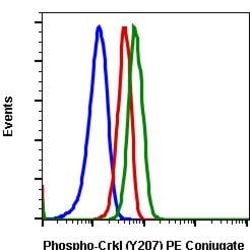Learn More
Invitrogen™ Phospho-CrkL (Tyr207) Recombinant Rabbit Monoclonal Antibody (CrkLY207-G4), PE
Rabbit Recombinant Monoclonal Antibody
$245.00 - $601.00
Specifications
| Antigen | Phospho-CrkL (Tyr207) |
|---|---|
| Clone | CrkLY207-G4 |
| Content And Storage | 4°C |
| Applications | Flow Cytometry |
| Classification | Recombinant Monoclonal |
| Catalog Number | Mfr. No. | Quantity | Price | Quantity & Availability | |||||
|---|---|---|---|---|---|---|---|---|---|
| Catalog Number | Mfr. No. | Quantity | Price | Quantity & Availability | |||||
|
PIMA527993
|
Invitrogen™
MA527993 |
100 Tests |
Each for $601.00
|
|
|||||
|
PIMA536970
|
Invitrogen™
MA536970 |
10 Tests |
Each for $245.00
|
|
|||||
Description
Recombinant rabbit monoclonal antibodies are produced using in vitro expression systems. The expression systems are developed by cloning in the specific antibody DNA sequences from immunoreactive rabbits. Then, individual clones are screened to select the best candidates for production. The advantages of using recombinant rabbit monoclonal antibodies include: better specificity and sensitivity, lot-to-lot consistency, animal origin-free formulations, and broader immunoreactivity to diverse targets due to larger rabbit immune repertoire.
The CRKL gene encodes the CRK-like protein, an adaptor protein that plays a crucial role in intracellular signaling pathways related to cell proliferation, differentiation, and migration. CRKL contains SH2 and SH3 domains that facilitate interactions with other signaling molecules, influencing multiple pathways such as the MAPK, PI3K, and STAT pathways. It is involved in processes like cytoskeleton reorganization and immune cell signaling, with significant implications for development and cancer. CRKL is notably associated with Philadelphia chromosome-positive leukemias, where it interacts with the BCR-ABL fusion protein, contributing to leukemogenesis. Additionally, dysregulation of CRKL can affect cardiovascular development, leading to congenital heart defects. Research into CRKL focuses on understanding its role in signal transduction and its potential as a therapeutic target due to its involvement in oncogenic and developmental pathways.Specifications
| Phospho-CrkL (Tyr207) | |
| 4°C | |
| Recombinant Monoclonal | |
| Liquid | |
| IgG κ | |
| Human, Mouse | |
| CRKL | |
| 1110025F07Rik; AA589403; AI325100; CRK like proto-oncogene, adaptor protein; CRKL; crkl {ECO:0000312; crk-like protein; crk-like protein {ECO:0000250; Crkol; EMBL:AAH85865.1, ECO:0000312; OTTHUMP00000198539; RGD:1308531}; UniProtKB:P46109}; v-crk avian sarcoma virus CT10 oncogene homolog-like; v-crk sarcoma virus CT10 oncogene homolog (avian)-like; v-crk sarcoma virus CT10 oncogene homolog-like | |
| CRKL | |
| Primary | |
| Protein A/G |
| CrkLY207-G4 | |
| Flow Cytometry | |
| PE | |
| Rabbit | |
| RUO | |
| PBS with 0.2% BSA and 0.09% sodium azide; pH 7.4 | |
| P46109, P47941 | |
| 12929, 1399 | |
| A synthetic phospho-peptide corresponding to residues surrounding Tyr207 of human phospho CrkL. | |
| Antibody |
Your input is important to us. Please complete this form to provide feedback related to the content on this product.
